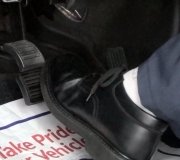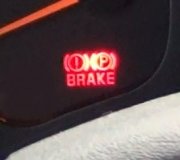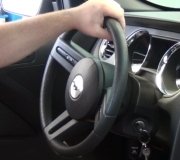This van is a combination camper, work van, and daily driver, and has the Ford XLT package. It is garaged all the time, and looks new under the hood. I had an Auburn limited-slip differential installed in 2009, using the same OEM 3:55 gear ratio. The rear disc brakes were removed at that time, since the differential installers removed the housing to chemically clean out a lot of metal debris.
Back to the brake pedal, if I push further on the pedal, the van stops again, but soon the pedal begins sinking again, and the van begins creeping forward again.
If I pump the pedal two or three times, the pedal is firmer and higher again, but soon begins sinking when I am holding the van stopped in drive, such as at a traffic light.
An ASE certified mechanic, who has his own two man repair shop, replaced the master cylinder about eight months ago, and when I asked him if he had done any special procedure to bleed the ABS unit, he replied that no special procedure is necessary. Since then, I have heard a little about the need to bleed the ABS unit, using a special procedure.
For about a week after he replaced the master cylinder with a new Ford OEM unit, the pedal was very "normal" high, firm, no sinking.
After that week, over a period of a few days, the pedal gradually returned to its "sinking" ways, just like before the master cylinder replacement. That was eight months ago, and has been the same since, not getting any worse.
I have had the van since 2008, have had all the pads replaced in 2012, and at that time the front wheel bearings were lubed and adjusted, (still have plenty of pad thickness on them, I drive it very gently, brakes do not do anything else wrong, ABS system does seem to work reasonably well in snow), and have had the brake system flushed/filled at least twice since 2008.
The fluid level in the master cylinder never drops, and when examining under the van, I see no signs of brake fluid leaking anywhere.
Van has 155,000 miles on it now, had 92,000 when I bought it used in 2008.
Best regards,
Ed
SPONSORED LINKS
Wednesday, May 9th, 2018 AT 6:54 AM




